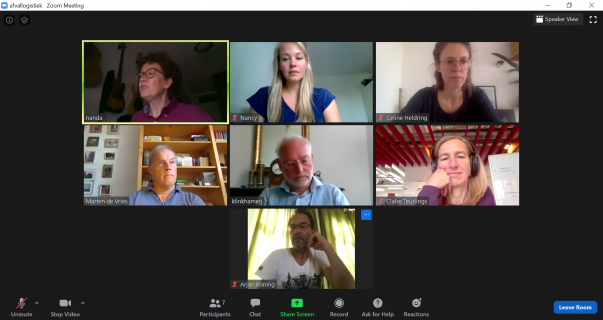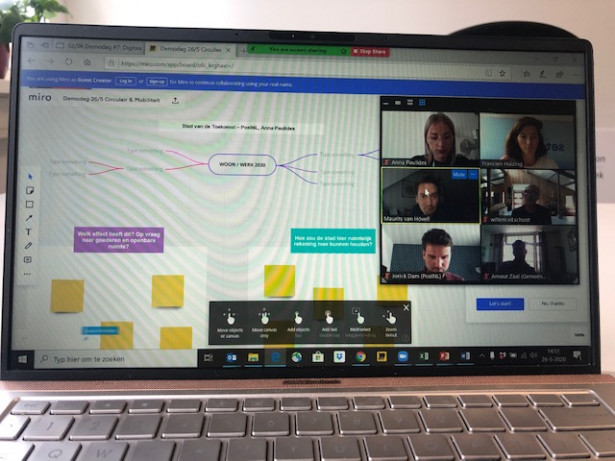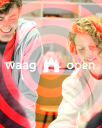Amsterdam Smart City is an independent innovation platform that brings together innovative companies, knowledge institutions, government and citizens to shape the city of the future. How do we bring these people together? One of our activities are Demo days. Demo Days are intended to boost the progress of the various innovation projects, to put requests for help on the table, share dilemmas and involve others. Which topics were discussed and will be developed in the months to come? Get a quick overview!
City of the future
The quality of life is high on the agenda, also at postal and parcel service PostNL. In cities, public space is scarce and interests are diverse. A tourist wants to see parts of city, a resident wants a park or playground, PostNL needs space to load and unload vans. What does this shortage of space mean for logistics?
During the Demo Day, one thing that was clear: flexibility is needed. Flexibility in the usage of space, roads and mobility hubs. Therefore it is necessary to know what times are the busy ones. Innovative ideas that came across: a system with tubes for parcel delivery in new areas or a logistics subscription. People agreed that working from home as we did during the COVID-19 lockdown, is permanent and more flexibility between living and working is required. We will be at home more often. PostNL wanted to know what energy consuming element in a household should be digitized. An example could be homes that are made without a kitchen. The most urgent and desirable flow that is mentioned by the group is air conditioning. In the summer, more households purchase air conditioning. Why can't we organize this ‘remotely’ instead of everyone having their own?
Government as Platform
The Municipality of Haarlem wishes to transit from a traditional “service provider” into a trusted digital facilitator. Evelien Wamelink from Municipality of Haarlem and Olina Terzi from Digital Society School (DSS) started collaborating approximately a year ago. The goal of the municipality is to design transparent and personalized governmental services for the digital age, guided by public values such as democracy, privacy and transparency. Adapting a “learning by doing” approach, Haarlem and DSS redesigned two services, Birth Registration and Social Benefit Application, while applying a service design approach. What are key factors for success and key challenges for digital transformation inside government according to our public and private partners?
The key take-away points include:
• Governmental digital transformation visions should be co-created with domain experts from across the organization.
• Initiatives like VNG’s Common Ground are key to developing interoperated and transferable solutions.
• A main barrier is that civil servants are usually in crisis management mode, solving problems without taking a long-term approach or perspective. At the same time, the Covid-19 crisis offers a unique opportunity to embed digital skills throughout the whole organization.
• Scattered landscape of field labs and testbeds lead to the “not-invented-here” syndrome and governments wanting to reinvent the wheel.
• A key challenge is posted by an existing / legacy way of working, for instance departmental (data) silos.
• Taking the user view as the departure point, rather than technical possibilities, is important for success.
• More knowledge and toolkits are needed which address how to incorporate ethics and values in service redesign.
Green Hydrogen
In the energy transition, we are looking for various new, renewable energy carriers, including
hydrogen. National and local governments are aiming to develop a hydrogen economy. Hydrogen is particularly useful for large-scale applications, think of freight transport and the industry. For this we need to create supply, demand and infrastructure. Also in the Amsterdam Metropolitan Area governments, private companies and knowledge organizations are involved. However, there is no integrated approach yet, the overview is missing and parties do not always collaborate. For the Province of North Holland, it is important to boost, accelerate and facilitate the energy transition. What role could or should the Province take in the hydrogen field?
There is, of course, no simple answer. But it is clear that the role of the government - including the Province - is crucial. A good mix of (compelling) regulations and subsidies can accelerate processes, but shared ownership is something to strive for as well. The so-called "commons" could be an opportunity. In this concept multiple parties from one cooperative structure develop new initiatives. The form of commons originated from grassroots residents' organizations and is now increasingly common. Also the EU wants to provide a solid legal basis for the commons.
In this case the conclusion is that the Province cannot control everything. The case is too big, there are too many aspects (technology, supply, demand, use of space, business case, interests, etc.) and too many players. Knowledge and studies are soon to be outdated. The advice for the Province was to choose a specific role and adapt quickly. The Amsterdam University of Applied Sciences AUAS will investigate how to contribute and find out what are the barriers for cooperation in this domain are.
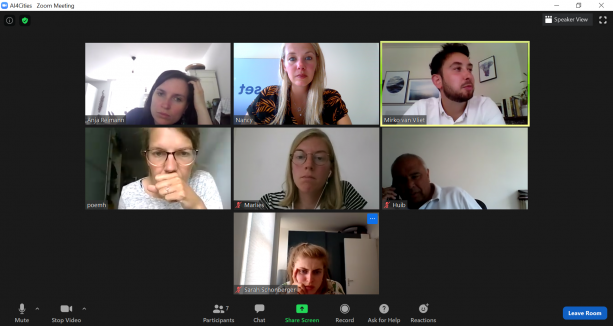
AI4Cities
Together with cities such as Paris, Helsinki and Copenhagen, the City of Amsterdam is participating in the European project AI4Cities. Six European cities and regions are looking for AI solutions in the field of mobility and energy to become CO2 neutral faster. All cities will tackle the same challenges and think of solutions for the port and the spaghetti of cables in the ground. At the end of the year the project will set up an open call for all companies with solutions. There is a total of 4.6 million euros
available. How can the cities reach the parties who have the right solutions? There must be many
parties with AI solutions, but don’t call themselves a party working on AI. How do you reach the creative entrepreneurs with solutions you don't know yet? And how do you ensure that it is not the usual suspects, but also parties with which you can stimulate innovation? A plea to look for the valuable and relevant ecosystems! There is also a big governance question behind all this. It is often not clear which organizations are responsible for the questions. And how can we get residents
interested in this project?
Waste logistics
The waste chain changed completely due to the pandemic. The Amsterdam University of Applied Sciences investigates the possible scenarios and actors. Offices are closed and do not produce waste / raw materials anymore for recyclers. Households produce much more garbage and consumers go often to waste dumping points. What does this mean in the long run and how does this change our circular ambitions? Municipalities are overwhelmed by the amount of household waste. However, there is hardly any waste from companies since offices are closed. That means that waste companies, responsible for collection of commercial waste, have little to do. What is their business model? Are they going bankrupt or not? And what does it mean for the circular economy if nobody is looking for recycled materials anymore?
If the situation is temporary, the impact won’t be big. But if working from home will be a new standard, this situation will be permanent. Less people in the office means there is less waste. That means the shift from industrial waste to household waste is maintained. Can commercial companies play a role the collection of household waste? If business waste continues to come in lower volumes, with less waste available for recycling, the question also arises whether we can strengthen the circular economy in another way. Can we make it interesting again to learn how to repair stuff or make something yourself?
Clean Energy Hubs
Where people are, there are goods. Sometimes on a small scale, in the form of parcel delivery, but also large volumes. Think of fuels, fodder, building materials. Also this large scale transport has to switch to clean energy. It means producing renewable fuels suitable for longer distances and for different modalities, especially with truck and inland shipping. And vessels have to be adapted to this. The Province of Noord-Holland wants to facilitate and accelerate this transition by setting up clean energy set up hubs, by 2024 at the latest. These are (semi) public accessible tank, loading or bunkering facilities with at least two alternative, renewable energy sources, (if desirable) in combination with other facilities such as public transport, catering, truck parking, meeting rooms etc.
Where and how to start? The playing field is complex, the time until 2024 short. In addition, as a result of the energy and circular transition, the cargo flows will undergo significant changes in the coming years, which does not lead to security of investments. Can governments, businesses, knowledge institutions, social institutions, startups and residents consumers contribute? We think any actor can play a role; citizens as consumers for example, boost sustainability in the chain. Now citizens have no idea what their logistics footprint is, so they cannot play a role. We see most of the opportunities for governments to collaborate with a number of large companies in the logistics and fuel sector. Find parties who want to, can have an impact and keep the scope manageable. Scale up afterwards. The government - including the Province – can accelerate these processes. By a nice mixture of (compelling) regulations and subsidies.
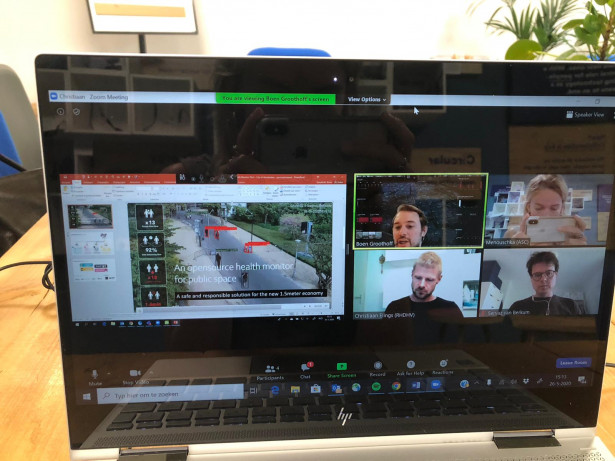
The meaning of the 1.5 meter rule for activities of organizations with regard to mobility?
The current crisis can be used as an opportunity to measures that we’re already underway to reduce the pressure on the mobility system and the living environment. During the session we agreed to not fall back to the situation we don't want, for example the revival of the car and extra space for car mobility. Behavior plays a key role in this.
The organizations in this working session stipulated their main concerns with guaranteeing the 1.5 meter rule with regard to mobility:
• Lack of space when managing flows – in the city, but also at events
• Retaining desired travel behavior - how do we care to make sure people don't stay out of public transport?
• Decreasing income - the business case of public transport and events are under great pressure
• How do we organize commuting for work employees?
• How do we reach people and companies to collaboratively think about mobility of the future
and to accelerate innovations?
• Responsible monitoring and use of data, including to get out of the smart lockdown
• Delayed investigations, tests and pilots
